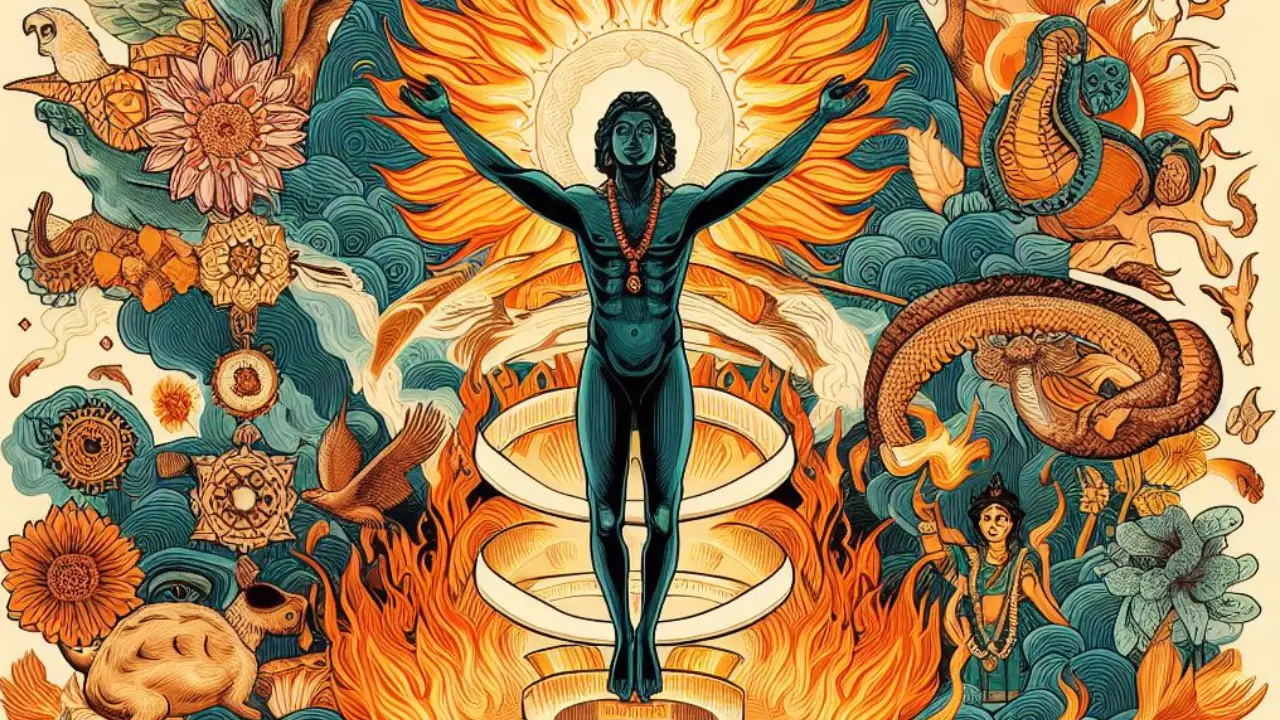The concept of reincarnation in Hinduism, also known as rebirth, is a central belief in many religions and spiritual traditions. One of the oldest and most well-known religious traditions that emphasizes the idea of reincarnation is Hinduism. In Hinduism, the cycle of reincarnation is known as Samsara, and the ultimate goal of spiritual practice is to achieve Moksha, or liberation from the cycle of birth and death.
In this blog post, we will explore the Hindu concept of reincarnation in depth, including the meaning of Samsara, the different states of existence, the law of karma, and the path to Moksha.
The Meaning of Samsara:
In Hinduism, Samsara refers to the cycle of birth, death, and rebirth that all living beings must undergo. According to Hindu belief, this cycle is eternal, with no beginning or end. All living beings, including humans, animals, and even gods, are subject to Samsara.
The goal of life in Hinduism is not to escape Samsara but to transcend it. To do so, one must understand the nature of existence and live a life that is in harmony with the laws of the universe.
The Different States of Existence:
Hinduism recognizes four main states of existence or worlds in which a living being can be reborn. These are:
The world of the gods (Devaloka): This is the highest state of existence, reserved for those who have lived a virtuous life and accumulated a great deal of positive karma. The gods are believed to enjoy an existence of pleasure, power, and longevity.
The world of humans (Manushyaloka): This is the most common state of existence, in which most people are reborn. Individuals have the opportunity to progress spiritually through their actions in the human world, which is considered a place of both pleasure and suffering.
The world of animals (Tiryakaloka): In this state of existence, a living being is reborn as an animal. Animals exhibit instinctive behavior and possess limited consciousness, leading people to believe they cannot achieve spiritual progress.
The world of demons (Patalaloka): This is the lowest state of existence, reserved for those who have committed evil deeds and accumulated negative karma. The demons are believed to be consumed by anger, hatred, and other negative emotions.
The Law of Karma and Reincarnation In Hinduism:
In Hinduism, the law of karma is central to the cycle of Samsara. Karma refers to the idea that every action has a consequence, either in this life or in a future life. Good actions lead to positive consequences, while bad actions lead to negative consequences.
The accumulation of karma determines the state of existence into which a living being will be reborn. Good karma leads to rebirth in a higher state of existence, while bad karma leads to rebirth in a lower state of existence.
The Path to Moksha and Reincarnation In Hinduism:
The ultimate goal of spiritual practice in Hinduism is to achieve Moksha, or liberation from the cycle of Samsara. Moksha is the state of spiritual liberation in which the soul is no longer subject to rebirth.
There are several paths to Moksha in Hinduism, including:
Karma Yoga: This is the path of action and selfless service. It involves performing one’s duties without attachment to the results, and dedicating all actions to the divine.
Bhakti Yoga: This is the path of devotion and love. It involves developing a personal relationship with the divine through prayer, worship, and meditation.
Jnana Yoga: This is the path of knowledge and wisdom. It involves the study of scriptures and philosophy, and the development of spiritual understanding.
Raja Yoga: This is the path of meditation and self-control. It involves the practice of meditation, concentration, and breath control to achieve a state of inner stillness and peace.
Regardless of the path chosen, the ultimate goal of spiritual practice is to overcome the ego and realize the true nature of the self. In Hinduism, the self is believed to be identical to the ultimate reality, or Brahman. Through spiritual practice, one can realize this truth and achieve Moksha.
The Significance of Reincarnation in Hinduism
Reincarnation holds immense significance in Hinduism, and it is a fundamental belief that shapes the entire religion. It serves as a reminder that every action has consequences and that we are responsible for our actions. Re also provides a sense of continuity and connectedness between different lives. It helps us understand that our actions in this life have implications for our future rebirths.
Reincarnation also allows for the possibility of redemption and growth. If a person has led a life full of vice in their current birth, they can still work towards redemption and accumulate good karma that will result in a higher rebirth in their future lives. This provides hope and motivation for individuals to live a virtuous life and work towards achieving Moksha.
Furthermore, the concept of reincarnation promotes a sense of detachment from material possessions and worldly desires. It reminds individuals that their current life is just one small part of a much larger journey and that their ultimate goal should be to achieve Moksha and break free from the cycle of Samsara.
Conclusion
The Hindu concept of reincarnation is a complex and multifaceted idea that has shaped the entire religion. It provides a sense of continuity and connectedness between different lives, and it serves as a reminder that every action has consequences. Reincarnation also offers the possibility of redemption and growth and promotes a sense of detachment from material possessions and worldly desires.
The ultimate goal of Hinduism is to achieve Moksha, which is the state of liberation from the cycle of Samsara. To achieve Moksha, individuals must work towards breaking free from the bonds of Samsara through various paths, including devotion, knowledge, and action.
Overall, the concept of reincarnation plays a crucial role in Hinduism, and it serves as a powerful reminder of the importance of living a virtuous life and working towards the ultimate goal of achieving Moksha.

